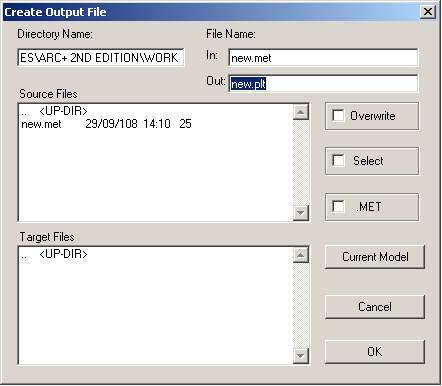Creating an Output File - *.MET format, *.PLT format
Home > 20 Plotting and printing > Creating an Output File - *.MET format, *.PLT format
Creating an Output File - *.MET format, *.PLT format
The Create output file dialog box contains two fields:
SOURCE files and directories (only the .MET files are listed).
Target files.
When the plotter is configured as output equipment, the fields against File name and TARGET will both display only the names of the plot files (*.PLT).

Dialog Box Options
The following are the options in the dialog box to create a file for plotting or printing
DIRECTORY NAME Select directory from the list.
NAME OF THE INPUT FILES Selects the file to be created in .MET format.
NAME OF THE OUTPUT FILES Option to change the output file name (when you create *.plt files from *.met files).
OVERPRINT Enable update to file.
.MET Creates an MET file from the current drawing. The SOURCE field lists the directories. Select a file in the directories listed to open a drawing. The TARGET field only lists the .MET files.
SELECTION Allows you to choose files in the source field.
SOURCE.CURRENT MODEL Selects the current model as the source for the output file.
CLOSE Close the dialog box without implement
A message box is displayed to indicate that the output file is being created.
Utilisation
1. Before creating an MET file, set the desired view of the model in the
working window.
2. In the dialog box Create an Output File, specify the name of the
desired directory and the file for the MET file. If the file exists, select
the Overwrite option to authorise the replacement of the file.
3. Select OK. The new .MET file is added to the list.
 Suggestion Users can prepare and save a .MET file without plotting it. For example, it is possible to send a file to another computer running ARC+, but with different parameters and plotter configuration. Users can also prepare a .MET file to plot the same drawing on different devices or with different configurations of the plotter like the scale or page layout. The configuration and parameters of plotter can be modified later and plot the .MET file at your convenience. The Plot of a .MET file is clearly faster than the direct plot of a plot file.
Suggestion Users can prepare and save a .MET file without plotting it. For example, it is possible to send a file to another computer running ARC+, but with different parameters and plotter configuration. Users can also prepare a .MET file to plot the same drawing on different devices or with different configurations of the plotter like the scale or page layout. The configuration and parameters of plotter can be modified later and plot the .MET file at your convenience. The Plot of a .MET file is clearly faster than the direct plot of a plot file.
Using Print and Plot Files
Users can create a plot file intended to be plotted on any computer that is not equipped with ARC+. A plot file (file name.PLT) contains all the information necessary for the plot including the parameters and plotter configuration. A print service to which your drawing is sent will also be able to make the plot of your drawing even if it does not have ARC+.
The plot from a plot file is clearly faster than the direct plot of the ARC+ model. Plot files can also be used so as to gain on precious time when multiple copies of the same drawing have to be plotted. It also enables you to select multiple files that will be sent in sequence to the plotter.
1. Before creating the plotted file, set the configuration corresponding to
the selected plotter. (See Plotter configuration or refer to the
print service as per the case).
2. Display the drawing as per the desired view, or convert it in .MET file
saved on the hard disk (See Creation of an MET file). Set the pagination desired.
(View plotter configuration).
3. Specify the name of the directory and the file for the file. If the file
already exists, select the Overwrite option to authorise the replacement.
4. Choose one of the following options:
To create the plot file from a drawing open on the screen, select the Current drawing option . The file name of the current drawing appears in the field From and To and followed by the extension .PLT.. The file name in the To filed can be changed if desired.
If you create the plot file from an MET file existing on your disk, select the name MET in input (extension.MET).
The output file .PLT shall appear in the list of files of the dialog box.
Plot to Plotter
The .PLT files are created from the MET files, or from a model on the screen.
